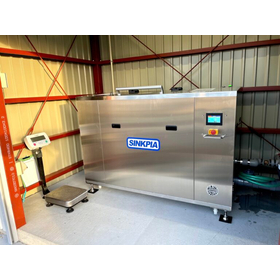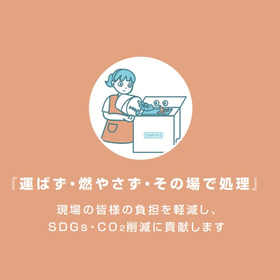【設置事例】日本発条株式会社様 豊田工場
生ごみを『運ばず・燃やさず・その場で処理』
日本発条株式会社様 豊田工場(愛知県)に 業務用生ごみ処理機シンクピア GJ-50を設置しました。
基本情報
これまでの生ごみ処理機の常識を覆す、『シンクピア』 【ステンレス製筐体による美観と清潔感】 ・従来製品とは一線を画す、厨房機器にも匹敵する高品質なステンレス製筐体を採用。 ・清潔で洗練された空間を演出。 【高性能微生物による効率的な生分解】 ・独自の微生物『シンクザイム』が、生ごみを効率的に生分解。 ・微生物の住まいとなる『微生物ハウス』は4種類。投入する食材に合わせて最適な組み合わせを選択。 ・従来型の木くずや籾がらに比べ、微生物の生息環境を大幅に改善し、生分解能力を向上。 【環境負荷低減とコスト削減】 ・効率的な生分解により、焼却処理に比べて生ごみ輸送コストを大幅に削減。 ・事業所で自己処理することにより、CO2排出量の削減に貢献し、環境負荷を低減。 【作業効率の向上】 ・誰でも簡単に操作できる設計で、従来型で困難だった室内設置も可能。 ・日量を守れば複数回の投入が可能。小型バケツでの投入により現場の負担を軽減。 ・大型機はリフトなどのオプションで投入も可能。 【充実したメンテナンス体制】 ・導入後のメンテナンス体制も整っており、アフターフォローも万全。
価格情報
お問い合わせください。
納期
型番・ブランド名
SINKPIA GJ-50
用途/実績例
【当社の取り組み】 ・生ごみを『運ばず・燃やさず・その場で処理』を理念に掲げ開発・提供・運用を行っています。 ・安全で快適に生ごみを処理する業務用生ごみ処理機の開発に取り組んでいます。 ・SINKPIA製品は、生ごみの種類により処理時間に差はありますが、概ね24時間で処理が完了します。 ・定期的に撹拌・シャワー機能を稼働させて微生物の活性化に必要な「酸素」「水」「温度」を管理し、 処理槽内の環境を保つことにより、微生物の力で生ごみを効率よく生分解していきます。 ・生分解性担体の開発、分解液の土壌改良剤の資源化、生分解性容器を処理する研究等をしています。 ・日本各地で積極的に展示会に出展し、ブース内で実際に生ごみを投入して実演を行っています。 【幅広い導入実績】 飲食店、コンビニ、スーパーマーケット、給食センター、道の駅、サービスエリア、 食品工場、社員食堂、ホテル、病院、介護施設、結婚式場、船舶、学校、保育園など、 多岐にわたる業態で導入されています。 導入実績は、カタログや展示会で紹介されています。 詳しい情報や導入事例については、シンクピアのWebサイトをご覧ください。
詳細情報
関連動画
カタログ(4)
カタログをまとめてダウンロードおすすめ製品
取り扱い会社
【捨ててほしいのは、これまでの生ごみ処理機の常識】シンクピアの開発コンセプトは、生ごみを『運ばず・燃やさず・その場で処理』生ごみを施設内で自己処理することで、CO2削減・SDGSなどに貢献できる製品です。『燃やす』に頼り切っていた日本の生ごみ処理も転換期を迎え、生ごみ処理機業界は時代のニーズを捉え多くの企業が参入してきています。ですが、研究・開発などの費用面の問題や、知識・経験・技能の乏しさから多くの企業が撤退を余儀なくされてきた業界でもあります。すでに一部は実証実験をスタートさせていますが、生分解性の素材を用いた微生物ハウスの開発や汚れた生分解性容器を処理する装置の開発、さらに、分解水の液肥や土壌改良剤などの資源化にも着目して研究を進めています。私たちはより多くのお客様に必要とされ、これからの地球環境にやさしい社会を実現できる企業を目指していきます。

























































